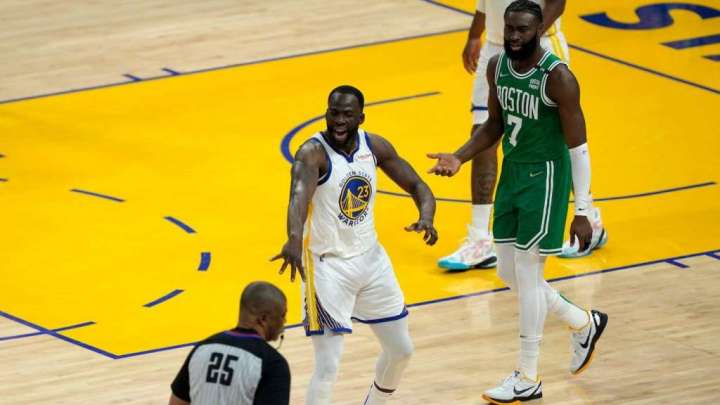SAN FRANCISCO — Steve Javie hasn’t scored a point or whistled a call in these playoffs, but enough people were talking about him during Game 2 of the NBA Finals that you would think he had led the Golden State Warriors to a blowout win.
In the NBA Finals, the rules aren’t always the rules

Upholding the rules in an NBA Finals game is optional. We’ve known this. We’ve all seen it. When the stakes are raised and the games matter more, some players get a longer leash, the benefit of the doubt. And officials show unmerited grace when instead they should be judging the action based purely on what it deserves.
Now we’ve come face-to-face with this reality in the NBA’s premier event featuring the Warriors and the Boston Celtics. Javie said it out loud when he explained why the Warriors’ Draymond Green could essentially play Twister on top of Jaylen Brown’s head, shove him in the back, tug on his shorts, then start talking smack — and still not get called for a technical foul.
See, Green already had one tech. Earlier, he had repeatedly extended his right forearm into another Celtics player, Grant Williams, to the point where the official must have thought: “Sigh. I guess after this third time, I better blow my whistle before Dray breaks out ‘The People’s Elbow.’ ” Green threw up his hands — Who, me?! — when the whistle finally came, because how dare the ref punish him for trying to tattoo Williams’s sternum?
But back to the dust-up with Brown. Neither player got hit with a technical — Brown had the unmitigated gall to stand up, a move that clearly provoked Green further — and before the officiating crew made the call, ABC turned to Javie Time. As an analyst, Javie analyzed the obvious and confirmed what we’ve all known: During the Finals, for better or worse, basketball’s written rules do not apply.
“You have to consider one player has a technical foul. Is this enough to call a double ‘T’ and eject the one player?” Javie said. “Personally, I would say nothing and I would let it defuse as that.”
Green remained in the game, where his force on both ends of the court factored into the Warriors’ 107-88 win. He stuck around long enough in this so-called basketball game to lower his head like an all-pro fullback and clear out Williams, then the next players he saw in green, so Stephen Curry could swish a three. Moving screen? Nope, not on any given Sunday in the NBA.
The phantom calls and bad calls could fill this column, but that’s not the point. The NBA chose the best officials in the world for the Finals, and even Zach Zarba, Tony Brothers and Josh Tiven (the Game 2 crew) were bound to make human errors. With the modern insistence on replay, they get more calls right than wrong — such as when Tiven thought he caught Warriors guard Jordan Poole obstructing Derrick White after the two got tangled and fell. Upon closer inspection, Poole was instinctively defending himself from White’s feet, and the crew reversed the call.
The problem comes when the rules get remixed and certain players receive preferential treatment. It offends the intelligence of fans — not to mention their faith in the product — when the refs huddle over the monitor, rewind and re-rewind the play so every angle can be seen and still come away with a decision that contradicts what should be common sense.
What would be a technical foul in the regular season, even if the offending player has already mucked the game up into his personal Thunderdome, should be a tech in any game, on any date. The rules in October should be the rules in June.
But they aren’t. And Green probably knew he could get away with trying to bully the Celtics well after he received his first technical in the first quarter. He’s that savvy and smart.
Don’t think for a second that, because Green’s game can border on the brutish, he’s just a walking six fouls or the roadie for the Warriors’ traveling rock band. The no-star all-star, Green has a basketball IQ that shines through when he moves the ball and finds teammates as they cut to the basket. And for the extracurricular nonsense, he knows how to test the limits when it’s necessary — such as when his team is staring at a 1-0 hole in the Finals — and to return to the side of sanity when the game turns the Warriors’ way and a victory comes into view.
On Sunday night, I asked Green about playing on the edge — wherever that is in these Finals. His response revealed that he knew what he was doing all along.
“For me to sit back and say, ‘Oh, I’m going to push it to this edge and try to pull back,’ that don’t work. I got to be me,” he said. “So with the first tech, it is what it is. That’s not going to stop me from being aggressive or doing what I do on the basketball court. Just got to live with the results.”
Chances are, Green had not yet heard Javie’s comments, but his words already had been confirmed by the officiating crew’s actions. During the playoffs, trampling on your opponents — and the rule book — is just part of the game.






